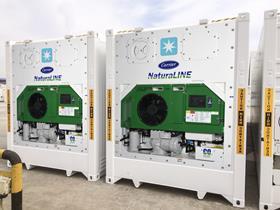
Maersk Line, the world’s largest container shipping line, has ordered the first 100 of a total of 200 refrigerated containers to be chilled by Carrier Transicold’s Naturaline natural-refrigerant based system.
The move is part of Maersk Line's aim to further reduce the environmental impact of its global shipping operations.
Carrier Transicold’s Naturaline is the first container refrigeration system to use the natural refrigerant carbon dioxide (CO2), which is a safe and non-ozone depleting gas with a global warming potential (GWP) of one.
There is no additional global warming impact resulting from any potential refrigerant leaks, as is the case with traditional systems, since the Naturaline unit uses carbon dioxide repurposed from outdoor air. It is also unaffected by phase downs of hydrofluorocarbon (HFC) refrigerants and is relatively inexpensive. It is classified as A1 for low toxicity and no flame propagation.
“To meet our sustainability goals and stay ahead of the new EU legislation, Maersk Line is keen to carefully evaluate all alternatives to the current synthetic refrigerants,” said Ingrid Uppelschoten-Snelderwaard, head of global equipment, Maersk Line. “The Naturaline system is an advanced technology with interesting potential for reefers. We chose it after laboratory testing of the unit’s performance with perishable and frozen commodities and look forward to gaining further operational experience with the system.”
The Naturaline units are being installed on 40-foot high-cube containers with anticipated delivery in the first quarter. Maersk Line will initially deploy the units on closed-loop routes between Europe and the Americas. Crew and landside training on unit operation and service is already underway.
“We are pleased that Maersk Line sees potential in the Naturaline unit to help it achieve its ambitious sustainability goals,” said David Appel, president, Carrier Transicold & Refrigeration Systems. “Carrier shares Maersk Line’s goals of improving the efficiency and sustainability of global container shipping, which protects the world’s perishable food supply and other goods as they move through the cold chain to the consumer.”



